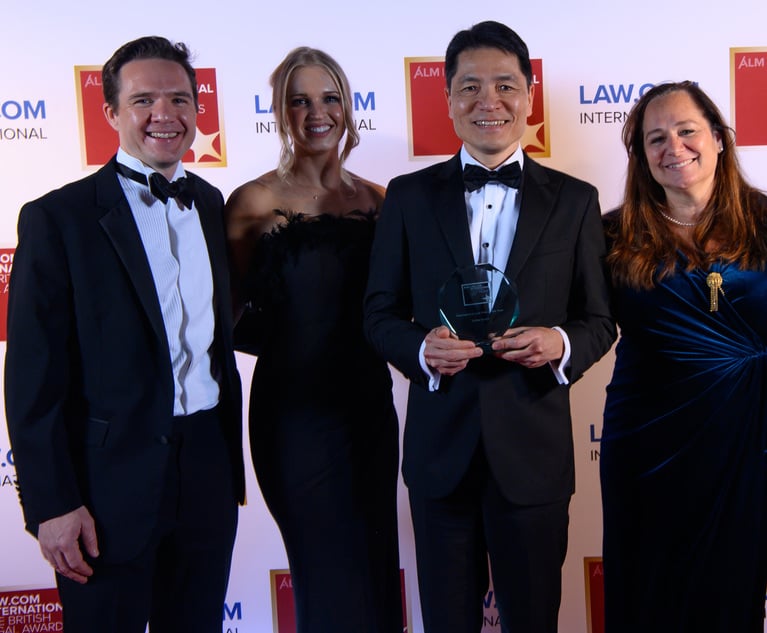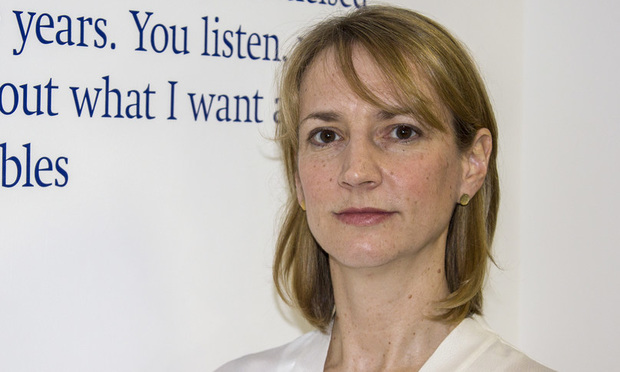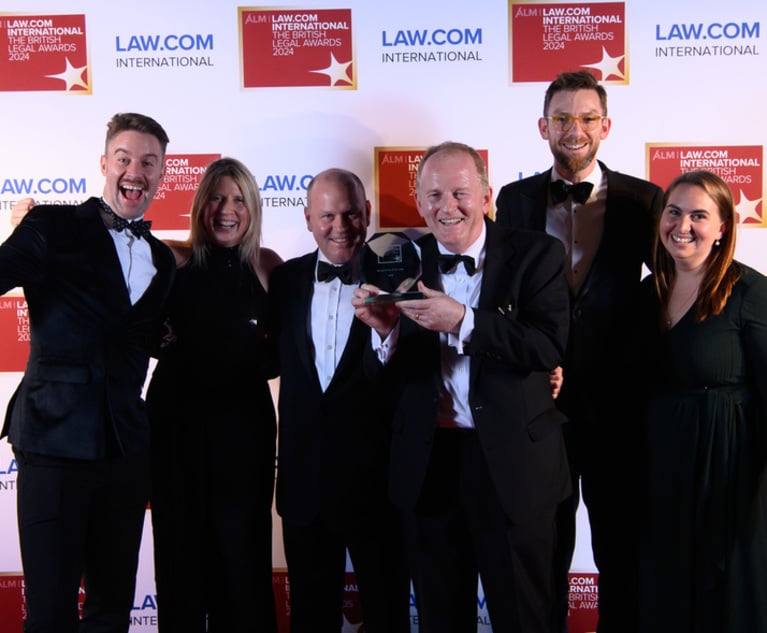'2020 Will See a Real Change': A Top Legal Innovation Awards Judge on What's Ahead
Freshfields' outgoing legal innovation officer speaks about digital transformation, enabling change and the perils of hype in the legal industry.
February 24, 2020 at 04:44 AM
5 minute read
Isabel Parker is Freshfields Bruckhaus Deringer's outgoing chief legal innovation officer. A mainstay of the legal tech scene, Parker has helped lead the firm's innovation offering, including the firm's flagship tech development offering, Freshfields Lab, and collaboration space, Freshfields Hub.
Parker is also a judge at this year's Legal Innovation Awards, which take place in May this year. Here she speaks with Law.com's U.K. arm, Legal Week, about what impresses her and how law firms should approach the ever-evolving field of technology.
How would you best define 'legal innovation'?
There is no neat, one-size-fits-all definition of 'legal innovation'. Genuine innovation is hard to achieve — and is not simply a project with a beginning and an end. To innovate successfully, organisations must commit to digital transformation. This is wider than technology, and can require fundamental change to an organisation's business model and mindset, as well as to the structures and incentives that support it.
What examples of innovation in the legal industry have impressed you in the past?
I am definitely not going to name names! But there are examples of law firms who have made radical changes to their business model, which I would consider highly innovate. Some of these are structural (changes to the partnership itself); others involve partnering with third parties in new ways. These changes have been catalysed by healthy competition — in the form of law companies and the Big 4, both of whom have scale and technology and fewer structural limitations than a traditional law firm.
To innovate successfully, organisations must commit to digital transformation.
There are some (very few) law firms who have moved successfully into creating client facing products. I have experienced first hand how challenging this can be so am always impressed by law firms and law companies who have built the process, capabilities and technology to enable this.
Do you think it would make sense for all lawyers to have tech training?
It depends what you mean by "tech training". I would expect every individual coming into the profession to be aware of how the legal services landscape is changing and to be prepared to help effect that change. This includes an awareness of how technology plays its part in the digital transformation of legal services.
This doesn't mean that lawyers need to be developers. Lawyers should concentrate on what they do best – understanding the client voice and sharing that knowledge with the technology professionals with whom they work to create the very best client experience.
What attributes are you most looking when it comes to successful cases of legal innovation?
Two attributes: strategic alignment and governance. Strategic alignment is essential because there is very little value in innovation for its own sake. Before developing a product you should have a clear business case and go-to-market strategy that aligns with the wider firm or business strategy, and have tested the proposition with clients.
We will see law firms and in-house teams moving beyond the shiny and new, and looking at digital transformation as a strategic priority.
Governance is an important and often overlooked success factor. Without some discipline and process, innovation efforts can become 'duplicative' or simply scatter gun and too diffuse. Good governance brings all innovation initiatives together and assesses them holistically. The trick is to balance governance and process with encouraging experimentation – tricky.
Who do you find to be more tech-savvy – private practice or in-house lawyers?
It's impossible to generalise. All organisations are different and vary in terms of team size, resources, budget and relationship to the technology function, as well as appetite for transformation. In-house teams can sometimes have less ability to influence technology decisions, meaning they need to work with the enterprise platforms and systems that the wider business has adopted.
But those platforms, like Microsoft Office 365, can deliver a lot of functionality if used smartly. Law firms can have larger budgets but less strategic focus. The best combination is law firms working with clients to deliver tech solutions.
How much of the talk around legal innovation do you think is just hype?
Too much, I am afraid. But we are now entering Gartner's "trough of disillusionment" and I think 2020 will see a real change. We will see law firms and in-house teams moving beyond the shiny and new, and looking at digital transformation as a strategic priority. There will be less of an obsession with technology and more of a focus on mindset change and growing the right capabilities to deliver that change.
As more law firms and clients move to the Cloud, they will be able to make use of technologies and platforms they already have (Office 365 for example) in a smarter way, rather than having to invest in entirely new platforms and solutions. So I think 2020 will be pivotal for many firms – and the white noise of hype will die down.
Isabel Parker is a judge at the Legal Innovation Awards, which are taking place on May 22. The deadline for entries is February 28. For more information, click here.
This content has been archived. It is available through our partners, LexisNexis® and Bloomberg Law.
To view this content, please continue to their sites.
Not a Lexis Subscriber?
Subscribe Now
Not a Bloomberg Law Subscriber?
Subscribe Now
NOT FOR REPRINT
© 2025 ALM Global, LLC, All Rights Reserved. Request academic re-use from www.copyright.com. All other uses, submit a request to [email protected]. For more information visit Asset & Logo Licensing.
You Might Like
View All
International Law Firm of the Year: A Q&A with Sidley Austin's London Managing Partner
5 minute read
Inside Travers Smith's AI Training, Development Efforts

From Olympic Aspirations to Legal Innovation: Tom Dunlop's Journey to Founding Summize
8 minute readLaw Firms Mentioned
Trending Stories
- 1South Florida Attorney Charged With Aggravated Battery After Incident in Prime Rib Line
- 2'A Death Sentence for TikTok'?: Litigators and Experts Weigh Impact of Potential Ban on Creators and Data Privacy
- 3Bribery Case Against Former Lt. Gov. Brian Benjamin Is Dropped
- 4‘Extremely Disturbing’: AI Firms Face Class Action by ‘Taskers’ Exposed to Traumatic Content
- 5State Appeals Court Revives BraunHagey Lawsuit Alleging $4.2M Unlawful Wire to China
Who Got The Work
J. Brugh Lower of Gibbons has entered an appearance for industrial equipment supplier Devco Corporation in a pending trademark infringement lawsuit. The suit, accusing the defendant of selling knock-off Graco products, was filed Dec. 18 in New Jersey District Court by Rivkin Radler on behalf of Graco Inc. and Graco Minnesota. The case, assigned to U.S. District Judge Zahid N. Quraishi, is 3:24-cv-11294, Graco Inc. et al v. Devco Corporation.
Who Got The Work
Rebecca Maller-Stein and Kent A. Yalowitz of Arnold & Porter Kaye Scholer have entered their appearances for Hanaco Venture Capital and its executives, Lior Prosor and David Frankel, in a pending securities lawsuit. The action, filed on Dec. 24 in New York Southern District Court by Zell, Aron & Co. on behalf of Goldeneye Advisors, accuses the defendants of negligently and fraudulently managing the plaintiff's $1 million investment. The case, assigned to U.S. District Judge Vernon S. Broderick, is 1:24-cv-09918, Goldeneye Advisors, LLC v. Hanaco Venture Capital, Ltd. et al.
Who Got The Work
Attorneys from A&O Shearman has stepped in as defense counsel for Toronto-Dominion Bank and other defendants in a pending securities class action. The suit, filed Dec. 11 in New York Southern District Court by Bleichmar Fonti & Auld, accuses the defendants of concealing the bank's 'pervasive' deficiencies in regards to its compliance with the Bank Secrecy Act and the quality of its anti-money laundering controls. The case, assigned to U.S. District Judge Arun Subramanian, is 1:24-cv-09445, Gonzalez v. The Toronto-Dominion Bank et al.
Who Got The Work
Crown Castle International, a Pennsylvania company providing shared communications infrastructure, has turned to Luke D. Wolf of Gordon Rees Scully Mansukhani to fend off a pending breach-of-contract lawsuit. The court action, filed Nov. 25 in Michigan Eastern District Court by Hooper Hathaway PC on behalf of The Town Residences LLC, accuses Crown Castle of failing to transfer approximately $30,000 in utility payments from T-Mobile in breach of a roof-top lease and assignment agreement. The case, assigned to U.S. District Judge Susan K. Declercq, is 2:24-cv-13131, The Town Residences LLC v. T-Mobile US, Inc. et al.
Who Got The Work
Wilfred P. Coronato and Daniel M. Schwartz of McCarter & English have stepped in as defense counsel to Electrolux Home Products Inc. in a pending product liability lawsuit. The court action, filed Nov. 26 in New York Eastern District Court by Poulos Lopiccolo PC and Nagel Rice LLP on behalf of David Stern, alleges that the defendant's refrigerators’ drawers and shelving repeatedly break and fall apart within months after purchase. The case, assigned to U.S. District Judge Joan M. Azrack, is 2:24-cv-08204, Stern v. Electrolux Home Products, Inc.
Featured Firms
Law Offices of Gary Martin Hays & Associates, P.C.
(470) 294-1674
Law Offices of Mark E. Salomone
(857) 444-6468
Smith & Hassler
(713) 739-1250










